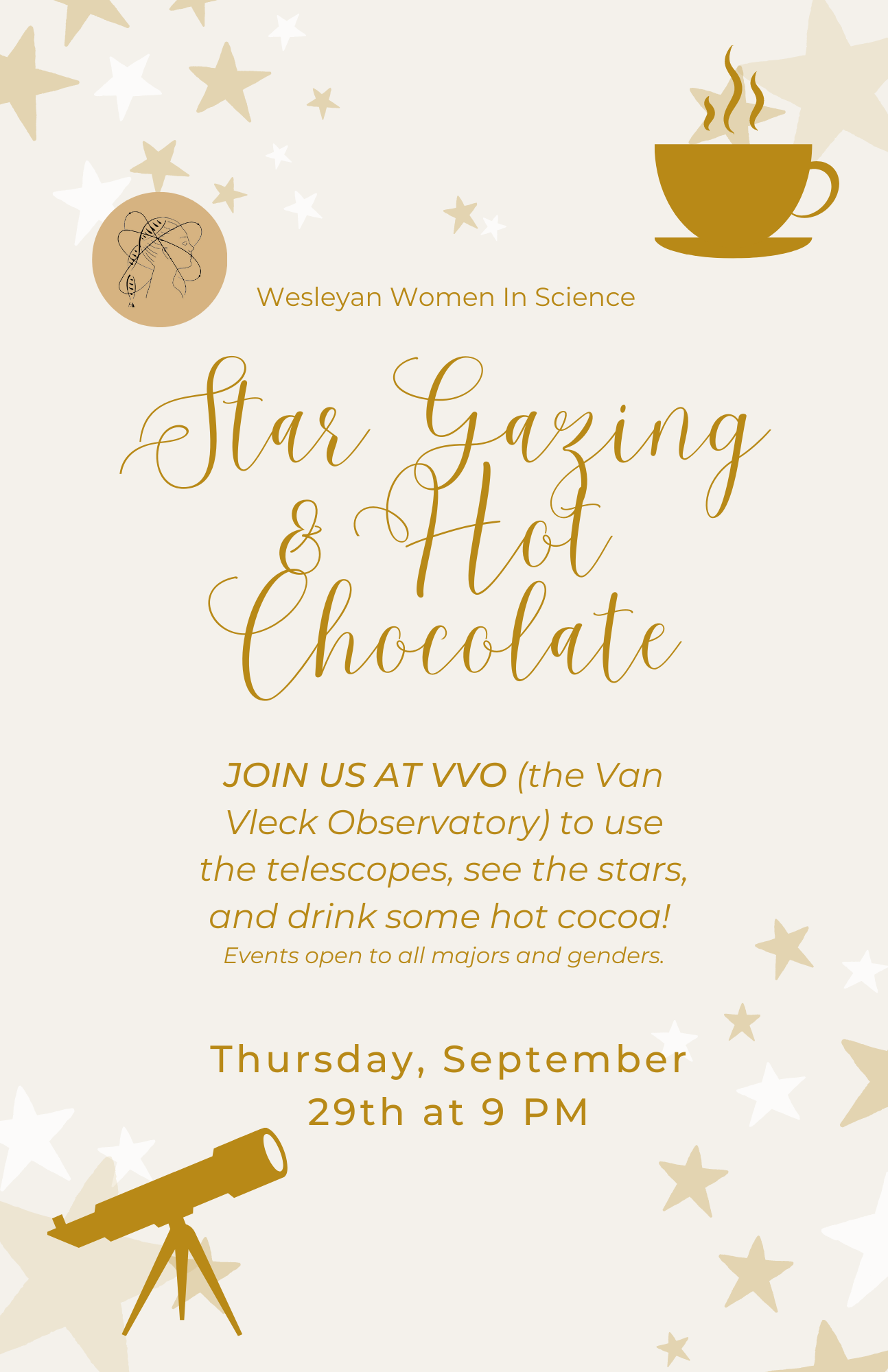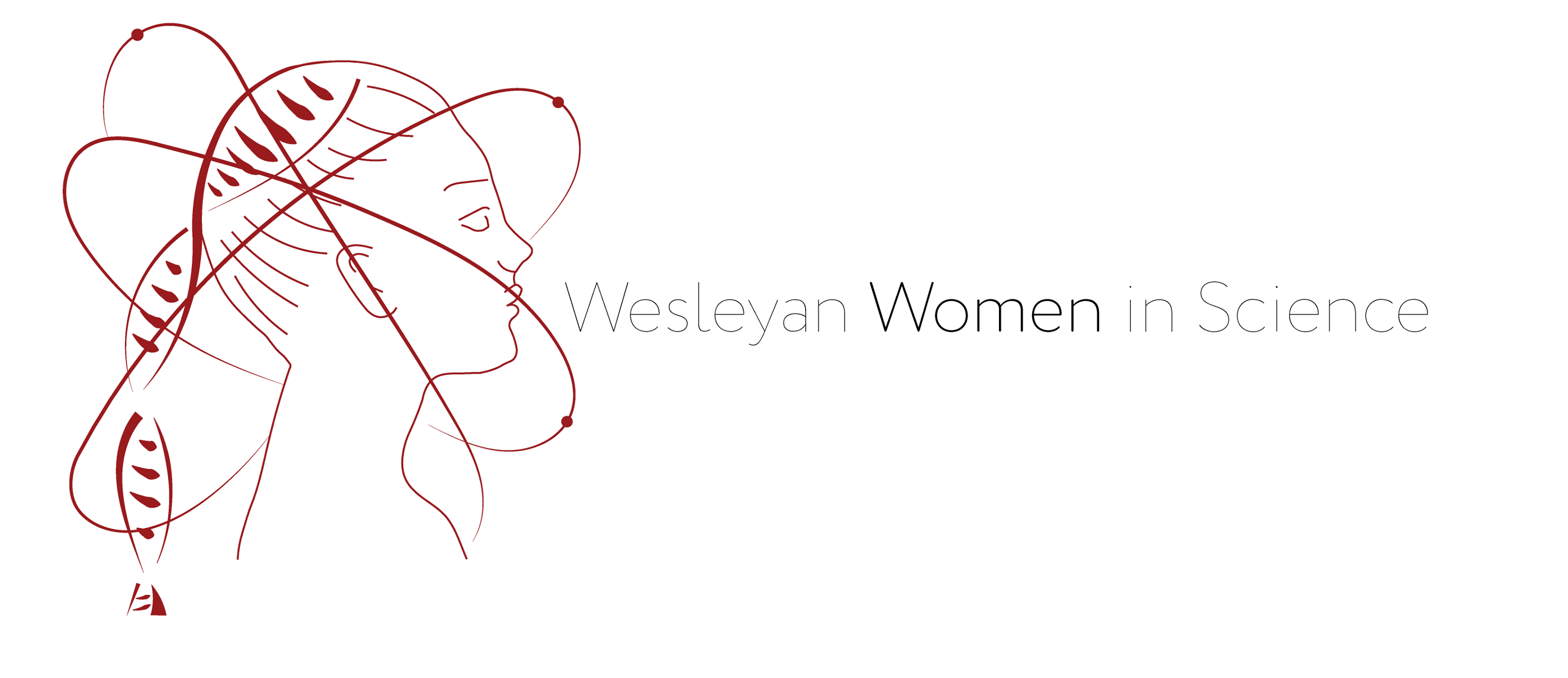It was a warm day in early September and a cacophony of students’ voices could be heard streaming across Andrus field. But it wasn’t the sounds of students cheering at a football game, it was the fall club fair. The massive white tent outside of Usdan was packed with tables behind which eager club leaders would try to advertise their groups to roaming first years and transfer students. Back in the fall of 2019, I was one of those students, trying to find my way through the sea of clubs and teams around me.
A friendly voice called out to me, “are you interested in studying science at Wes?.” I turned around to see the “Wesleyan Women in Science” sign on the table. The voice was coming from an enthusiastic sophomore named Hannah who would later become a close friend and colleague of mine on the Wesleyan Women in Science Steering Committee. But at the time, she was just a friendly face in a crowd of students trying to get me to join their clubs. After having put my email down on what I already thought was an excessive number of club sign up sheets, I was hesitant to hear another spiel from yet another person about their student group.
Throughout our conversation, I really felt like Hannah leveled with me. She met me where I was instead of giving me the superior and generic tone that freshman are often met with in their first few weeks of school. She encouraged me to attend the club’s kickoff meeting of the semester and apply for the steering committee, if I was interested.
After only my first few weeks at Wesleyan I had become part of a strong and dedicated community of other female-identifying individuals in STEM who were passionate about creating opportunities for each other and carving out a spot for other students like me.

I am now entering my seventh semester on the steering committee for WesWis, as it is fondly called, and have strived to continue building the dedicated and tight-knit community that I entered into as a bright-eyed and bushy-tailed first year only three years ago. However, it wasn’t until I started writing this article that I realized I wasn’t familiar with the WesWis community that had existed for over a decade before I arrived.
Excited to learn more, I sat down with the current faculty advisor to the steering committee, Associate Professor of Astronomy and Integrative Sciences, Dr. Meredith Hughes, who has been advising the committee for eight years now. Fisk Professor of Natural Sciences, Ishita Mukerji, also helped me piece together the origins of the organization.
According to Hughes and Mukerji, the organization was started under a grant from the Howard Hughes Medical Institutes, which funded the group for about 20 years. The grant supported the group’s efforts to run many of the types of the activities still run by WesWis today. The group was led by a steering committee who was advised by a member of the faculty or a postdoctoral fellow (the leadership structure of WesWis today reflects this).
The first faculty advisor to the steering committee was Dr. Laurel Appel, adjunct associate professor of biology and senior research associate. Appel was extremely passionate about expanding opportunities for students in underrepresented groups and channeled this passion into heading up Wesleyan’s Ronald E. McNair Program.
After Appel passed away in 2013, Mariah Schug, a visiting professor and postdoctoral fellow in the Psychology Department took over leadership of the steering committee.
When Professor Hughes joined the steering committee almost a decade ago, she had already been pursuing her interest for gender equality in the sciences for several years.

As an undergraduate student, she played an active role in her university’s women in science organization. Then in graduate school she served on the Committee on the Status of Women in Astronomy. In 2014, Hughes took charge on the demographic survey looking at how women’s representation in different levels of academia had changed over time.
“When the opportunity came to, to be the faculty advisor to the organization, I was really excited about [it].” Hughes said. “Even though I had been working on a national scale on some of these issues, I think it’s also at least as important and more rewarding to work on a local scale with the students here. [I]t’s something that I enjoy doing. And I’ve been doing it ever since.”
While every faculty advisor to the steering committee puts their own spin on the organization, the committee (and the club) is ultimately run by the students. Every other week, the steering committee meets to plan upcoming events and give each other feedback on prior events. While the committee is overseen by a faculty member, decision making is democratic and event planning is a very collaborative process.
The committee is made up of female-identifying students with a wide range of STEM backgrounds and interests.
“I joined WesWIS to aid in the much-needed support of women in STEM on Wesleyan’s campus,” said Victoria Dozer ’24, an Astronomy major and Physics minor who has been a trailblazing member of the steering committee since the fall of 2021.
Dozer went on to emphasize that although WesWis has been a place for her to follow her passion for gender equality in the sciences, what she found there has been “a lot more [than that].”
“WesWIS has introduced me to some of the most lovely and brilliant women I know, and created a community where I feel professionally and socially understood.”
For Hannah Docter-Loeb ’22, the WesWis steering committee provided her a place to hone her own communication and leadership skills. Like Dozer, she also found an overwhelming sense of community in the organization.
“WesWis was a great way for me to connect with other female-identifying students who had the same interests as me. It also taught me how to organize events and be a leader, skills I was able to apply to other experiences both at Wesleyan and beyond.”
Docter-Loeb also emphasized the durability of the bonds she made during her time on the steering committee.
“I also just loved hanging out with steering committee every two weeks—even though our meetings were mostly business we had a lot of fun and though I’ve now graduated, I’m still close to some of the people I met there.”
Each semester, the steering committee plans a slew of events for the semester. The activities range from social gatherings to professional development opportunities. One of the organization’s longer running annual events is “stargazing and hot chocolate.” Each fall, interested students meet steering committee members at the top of Foss hill to observe planets and stars over Middletown while sipping on hot cocoa and eating cookies. It is one of Professor Hughes’ favorite events of the year.
“…every year I look forward to this group of WesWis with students descending on the observatory drinking hot chocolate while we look at the stars, it has such a great energy to it, because it’s purely for fun, and it’s a little bit nerdy, and it’s wonderful,” Hughes recalled, fondly.

This year WesWis plans to hold the event on Thursday September 29th at 9pm on Foss Hill. The committee also has plans in the works to run a joint event with the Adolescent Sexual Health Awareness (ASHA) student group on campus to highlight issues around women’s health. The committee is additionally planning to continue its mentoring program, which connects first and second year female-identifying students interested in STEM with upperclassmen mentors in their fields of interest.
At this year’s club fair, it was my job to stand behind the WesWis table and tell new Wesleyan students what WesWIS was all about. As I stood on Andrus field, flagging down wide-eyed first years, I hoped that some of them would carry on the legacy of supporting women in STEM at Wesleyan, as I had. I hoped that my WesWis elevator pitch would resonate with some of them, as Hannah’s had resonated with me three years before.
More information about WesWis’s upcoming events can be found on the club’s instagram page @weswomeninscience or website.


